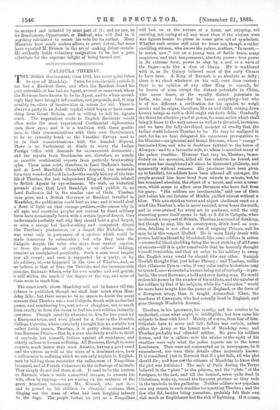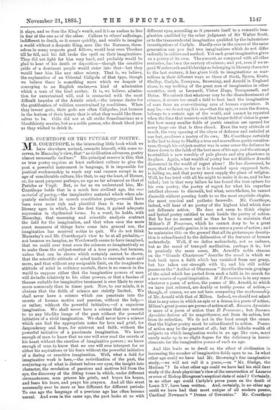CALIGITLA THEEBAU.
THE British Government, since 1852, has never quite taken its eyes off lliandelay. Twice for considerable periods it has had a Resident there, and when the Resident found his post untenable, it has had an Agent, avowed or unavowed, whom the Burmese have known to be its Agent, and to whom accord- ingly they have brought information, and proposals, and, it may possibly be, offers of insurrection in return for aid. There is always a party in an Asiatic capital which hopes or fears some- thing from Great Britain, and is willing to tell its Agents much. The suggestions made to English Residents would often make the most experienced Continental diplomatists open their eyes; and it is a tradition with these gentle- men, in their communications with their own Government, to be as cynically frank as the Venetian Envoys used to be in their communications with the dreaded Signori. There is no Parliament at Simla to worry the Indian Foreign Office with demands for inconvenient documents ; and the reports from Residencies are, therefore, as nearly as possible confidential reports from perfectly trustworthy spies. There must exist, therefore, in Lord Dufferin's bands, and at Lord Randolph Churchill's disposal, the materials for a very wonderful book indeed,—the weekly history of the true life of Theebau, the last independent King of Burmah, related to British Agents by eye-witnesses. We wish, on historical grounds alone, that Lord Randolph would publish it, as Lord Dalhousie did in the similar case of Oude. Theebau once gone, and a British Governor or Resident installed in Mandelay, the publication could hurt no one ; and it would shed a flood of light on that strange problem,—the reason why in all ages and countries peoples not coerced by direct military force have occasionally borne with a certain type of despot. One understands perfectly well why they should bear a good despot, or even a savage but hard-working and competent despot like Theeban's predecessor, or a despot like Nicholas, who was creel only in pursuance of a system which could be made innocuous by submission ; but why they bear the Caligula despot, the ruler who slays from wanton caprice, or from the pleasure of cruelty, or at others' bidding, remains an unexplained perplexity. Such a man must inspire fear all round ; and even if supported by a party, or by his soldiery, or,—as happened in the case of Tiberius, and, as we believe, in that of Ivan the Terrible, and the incomparable monster, Galeazzo Sforza,—by his own sombre and evil genius, is still within the reach of the dagger or the cup, and none of them seem to reach him.
The exact truth about Mandelay will not be known till this volume is published, though we shall hear much when Man- delay falls ; but there seems to be no reason to doubt the usual account that Theebau was a true Caligula, drunk with unchecked power, and sanctioning frequent acts of slaughter, not so much from cruelty as from the desire to feel his own volition instantly executive. Though carefully educated in Ava for two years by a European tutor, and even placed for a time in the Doveton College, Calcutta, where everybody thought him an amiable but rather feeble person, Theebau, it is pretty clear, remained a true Burmese Prince,—that is, a man absolutely unable to think of anybody but himself, furious against all resistance, and utterly callous to human suffering. All Burmese, though in some respects much better than most Asiatics, having a good creed and the virtues as well as the vices of a dominant race, have a callousness to suffering which we can only explain to English- men by bidding them remember the callousness of Neapolitan lazzaroni, and of French vivisectors to the sufferings of animals. They simply do not feel them at all. It used to be the custom in Bnrmah, when a noble committed treason, to execute his wife, often by ripping,—we are writing on the evidence of the great American missionary Mr. Kincaid, who saw it,— and to pound up his children in chemists' mortars, then flinging out the mass of what had been laughing infancy to the dogs. The people looked on just as a Neapolitan
will look on at the torture of a horse, not enjoying, not resisting, not caring at all any more than if the victims were wax figures beaten to pieces in some grim act of symbolism. Whether such scenes still exist we know not, though a rather unwilling witness, who knows the palace, mutters, " In secret,— in secret, now ;" but on a young man of feeble brain, many suspicions, and that temperament, absolute power—true power in its extreme form, power to slay by a nod or a wave of the finger—acts like a dose of bhang. He is maddened with it, as De Quincy believed most of the early Caesars to have been. A King of Bnrmah is as absolute as deity ; there is no check whatever on his will, even from custom ; there is no opinion of any other King to consult, for he knows of none except the distant potentate in China, who never hears, or the equally distant potentate in India, who may bear—for he hears everything—but who is of too different a civilisation for his opinion to weigh much ; and he reigns, therefore, like an evil child, cutting down human beings as such a child might cut down dolls. Gradually the thirst for effective proof of power, for some action which shall bring it home to the very senses as well as to the mind, increases, and we have the fully-developed monster of cruelty that the Indian world believes Theeban to be. He may be maligned in part, for he, we fear, delegated his monstrous prerogatives to his Minister—an ignorant and brutal Barman, whose " energy " fascinated him, and who is doubtless faithful to the house of Alompra—and to a favourite wife, to whom is ascribed many of the palace cruelties. However that may be, Theeban, imme- diately on his accession, killed all the relatives he feared, and ever since has slaughtered all whom he distrusted pitilessly, and apparently without remorse. His provinces have been given up to banditti, his soldiers have been allowed all outrages, the people around him have lived from minute to minute, but he has remained absolute, the object of a terror, and even a rever- ence, which seems to affect even Bnrmans who have fled from his grasp. "His soldiers are invulnerable," said one of them just before his one fortress of Minhla yielded almost without a blow. This awe-stricken terror and abject obedience react on a mind like Theeban's, who is never resisted, never hears the truth, and is over-praised for every act he performs, until the very reasoning power itself seems to fail, as it did in Caligula, when he claimed a conquest of Britain. Theebau is accused of drinking, but though he may, like his countrymen, drink hard on occa- sion, drinking is not often a vice of reigning Princes, and he may be in this respect libelled. He is more likely drank with power, half-maddened by bloodshed, like some soldiers in action —successful blood-shedding being the most striking of all forms of success—till it is quite conceivable that he honestly thought himself irresistible, and that an order to his soldiery to sweep the English away would be obeyed like any other. Surajah Dowlah thought that just before Plessey ; and Theebau, unlike that villainous Prince—who, if• very calm native historians may be trusted, once vivisected a human being out of curiosity—is pro- bably, like most Barmans, a bold and even daring man. He would reckon his power by the number of his soldiers, and the number of his soldiers by that of his subjects, while his "education " would no more have taught him the power of England, or the force of a European army, than it taught Azimoollah Khan, the murderer of Cawnpore, who had actually lived in England, and gone through Woolwich Arsenal.
Theebau, in his ignorance, his cruelty, and his resolve to be unchecked, come what might, is intelligible; but how came his subjects to bear with him ? Mainly, of course, from fear of him. Orientals hate to move and fail ; failure was certain, unless either the Army or the lowest mob of Mandelay rose; and Theeban probably had offended neither. He gave his soldiers license, and for a callous mob the stories or the sight of his cruelties were only what the police reports are to the lower Londoners. They were not commented on in newspapers, be it remembered, nor were their details often accurately known. It is considered just in Bnrmah that if a plot fails, all who plot should die ; and how are the citizens of Mandelay to know that the plot was fictitious P The mob of Paris during the Terror believed in the " plots " in the prisons, and the "plots " of the foreigner, to the last, and till the instinct, never quite dead in Christians, woke up, cursed the innocent plotters as they rode in the tumbrils to the guillotine. Neither soldiers nor populace saw any reason in such cruelties for upsetting Theeban ; and the few who did, besides being powerless, probably felt their own risk much as Englishmen feel the risk of lightning. If it comes,
it slays, and so does the King's wrath, and it is as useless to live in fear of the one as of the other. Callous to others' sufferings, indifferent to death, so it comes quickly, and unable to imagine a world without a despotic King, men like the Burmese, them- selves in many respects good fellows, would bear even Theeban till be fell, and his fall broke the spell on their imaginations. They did not fight for him very hard, and probably would be glad to hear of his death or deposition—though the sensitive pride of a dominant people would enter into that—but they would bear him like any other misery. That is, we believe, the explanation of an Oriental Caligula of that type, though we believe there is something more which we despair of conveying to an English reader,—a kind of admiration which a man of the kind excites. It is, we believe, admira- tion for unrestrained will, and is connected with the most difficult impulse of the Asiatic mind,—the intense desire for the gratification of volition unrestrained by conditions. When they invent gods, their gods are often Calignlas, just because in the bottom of their hearts that is what they would like them- selves to be. Odin did not at all strike Scandinavians as a bloodthirsty maniac, but as a noble person, who drank blood just as they wished to drink it.



































 Previous page
Previous page